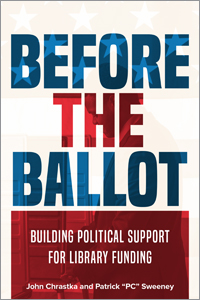Primary tabs
You don't need to be an ALA Member to purchase from the ALA Store, but you'll be asked to create an online account/profile during checkout to proceed. This Web Account is for both Members and non-Members. Note that your ALA Member discount will be applied at the final step of the checkout process.
If you are Tax-Exempt, please verify that your account is currently set up as exempt before placing your order, as our new fulfillment center will need current documentation. Learn how to verify here.
- Description
- Table of Contents
- About the authors
- Reviews
Buy as part of the Library Funding Bundle and save!
Let’s be blunt: library funding is political. And the struggle to secure funding is ongoing; the work that librarians need to do to influence local politics doesn’t just pop up in the few months before Election Day. It should span the years before or between elections. The authors’ previous book Winning Elections and Influencing Politicians for Library Funding targeted library ballot committees and advocacy organizations. But their new book speaks directly to librarians, library staff, and boards. It is designed to help library leaders understand and navigate the political nature of their work in the years leading up to a ballot measure or political initiative. Sharing the tools and tactics developed by their organization EveryLibrary, the nation’s first and only Political Action Committee for Libraries, in this book they
- discuss how the day-to-day work of librarians, their communications with the public, and their roles and responsibilities in the community can help increase the willingness of public and local elected officials to support funding libraries through taxes;
- guide readers through the practical side of running a public-facing Informational Communications Campaign for their library before Election Day;
- explain the concept of surfacing, the important groundwork of occupying a strong and positive space in the community during the years before and between ballot measures;
- demonstrate why surfacing is one of the most crucial steps a library can take to build and maintain support;
- share the most recent data insights into voter attitudes about libraries and librarians;
- show how libraries can coordinate internally to build new external partners;
- offer advice on finding, activating, and holding onto supporters; and
- discuss the path to the ballot with practical insights about how to get onto the ballot.
This essential resource is filled with concrete steps that librarians, library staff, and boards can take to ensure that political support is there when they need it the most.
Introduction
Part I Identifying, Cultivating, and Empowering Supporters
- Chapter 1 Surfacing the Library
- Chapter 2 Insights into Voter Attitudes about Libraries and Librarians
- Chapter 3 Radicalizing Americans about Libraries
- Chapter 4 Librarian as Candidate
- Chapter 5 Library as Cause
- Chapter 6 Creating the Fundable Plan
- Chapter 7 Building Partnerships and Joining Coalitions
- Chapter 8 Relationship-Building with People Who (Should) Care
- Chapter 9 Defining Audiences of Potential Supporters
- Chapter 10 Messaging for Funding Support
- Chapter 11 Understanding Engagement with Supporters and Activists
Part II Getting to Election Day
- Chapter 12 Transitioning to the Informational Communications Campaign
- Chapter 13 Where Problems Come
- Chapter 14 Why Libraries Lose
- Chapter 15 Steps in the Informational Communications Campaign
- Chapter 16 Ideal 36-Month Campaign from “Before the Ballot” to Election Day
Conclusion: Everyday Campaigning
Index
John Chrastka
John Chrastka is EveryLibrary's founder and is a longtime library trustee, supporter, and advocate. He is a former partner in AssociaDirect, a Chicago-based consultancy focused on supporting associations in membership recruitment, conference, and governance activities. He is a former president and member of the Board of Trustees for the Berwyn (Illinois) Public Library (2006–2015) and is a former president of the Reaching Across Illinois Libraries System (RAILS) multi-type library system. Prior to his work at AssociaDirect, he was director for membership development at the American Library Association. He is a member of the ALA as well as the Illinois Library Association and the American Political Sciences Association. He was named a 2014 Mover & Shaker by Library Journal and tweets @mrchrastka.
Patrick “PC” Sweeney
Patrick “PC” Sweeney is a tireless and innovative advocate for libraries and the current political director for EveryLibrary. A 2007 graduate of the San Jose School of Library and Information Sciences, he is a former administrative librarian of the Sunnyvale (California) Public Library and was executive director of EveryLibrary California, a statewide ballot committee to support library ballot propositions. He is active in the California Library Association and across library social media as a cofounder of the ALA Think Tank. His library blog is well respected, and he is a sought-after speaker and presenter. A recent project, the Story Sailboat, worked to provide library services and materials—by boat—in the San Francisco Bay area. He was named a 2015 Mover & Shaker by Library Journal and tweets at @pcsweeney.
”The volume is well organized and free of jargon and concludes with a 36-month campaign plan. VERDICT: Essential for librarians, library employees, and board members who don’t want to be left in the dust when it comes to funding."
— Library Journal
”The authors are very knowledgeable and provide great insight into this daunting endeavor that many libraries must face from time to time ... Highly recommended for public libraries."
— Catholic Library World
”The authors argue that educating people about the library isn’t enough; there must also be a call to action that elicits active support and leads to a larger next action. To this end, almost two-thirds of the book is devoted to the process of identifying, cultivating, and empowering library supporters ... A must-read for public library leaders, whether they are considering a ballot measure or might do so in the distant future."
— Booklist



